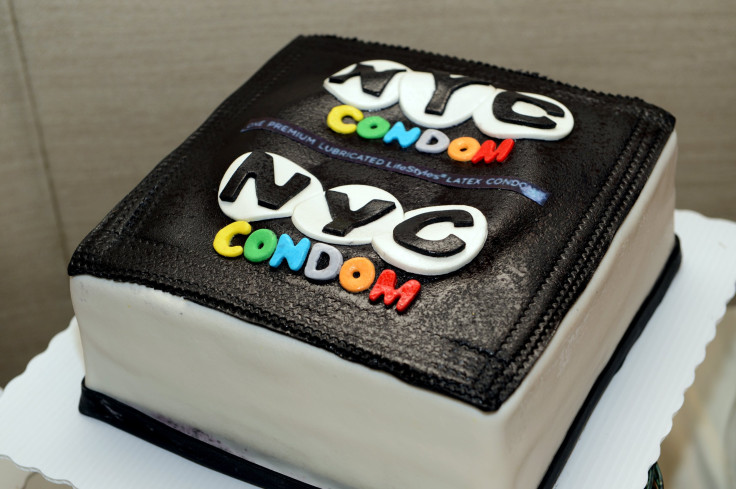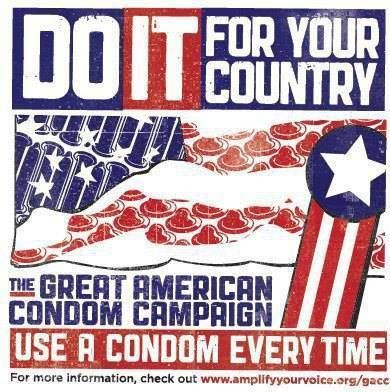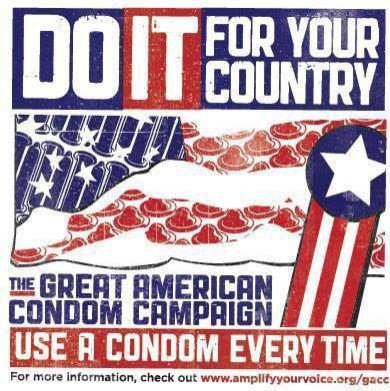Safe Sex Groups Slam Facebook For Double Standard On ‘Adult Content’

By most measures, “The Great American Condom Campaign” would seem to be a pretty easy cause to support. The national youth-led effort, through which volunteers distribute contraceptives on college campuses and educate young people about the importance of safe sex, features an array of colorful advertisements and clever teases such as “Do it for your country.”
It’s the perfect mix of passion and practicality, packaged with, if you’ll pardon the phrase, cold hard facts about the precarious mix of youth and sexuality. So when Advocates for Youth, the Washington, D.C.-based nonprofit behind the effort, tried to promote one of the ads on Facebook, representatives were shocked to learn that it was rejected for violating the site’s ad guidelines concerning “adult content.”
“It’s hypocritical,” Rachel Cooke, Advocates for Youth’s associate director of communications, said. “Compare it to all of the other sexualized content that’s allowed on Facebook or Instagram or other online platforms. How can information that could be protecting you and saving your life be censored?”

The rejection was no fluke. After some experimenting, the organization found that Facebook ads using the phrase “safe sex,” when targeting an audience of 18 and younger, were frequently blocked. In a phone interview Thursday, Cooke said equating sexual health information with adult content sends a dangerous message to the people who need it most.
“Young people are eager, and they’re seeking out information, because they don’t often have that at school,” she said. “And when they can’t find it, they find the worst sort of information.”
Advocates for Youth, Cooke said, has been reluctant to place safe sex ads on Facebook ever since the initial rejection a few years ago, but as it turns out, the problem of distributing important sexual health information continues to be widespread across various social media platforms. Everywhere from Twitter to Pinterest to Yahoo, groups seeking to educate the public -- be it about safe sex, sexually transmitted diseases, sexual violence or any number of issues -- say they are finding their ads lumped in with prohibited content such as pornography and ads for sex toys, all due to policies they say are unable to distinguish between sexual health and sexual gratification.
“We were shocked when our efforts to increase the profile of vaginismus -- a health condition -- on Facebook were denied,” Deborah Arrindell, vice president of health policy for the American Sexual Health Association, said. “Facebook decided our ad was promoting a ‘sexually explicit product.’ All we were promoting was sexual health information. This is a condition that causes painful intercourse. Women are embarrassed to discuss it, even with health care providers.”
Let’s Talk About Sex -- Or Not
Despite sometimes being championed as bastions of free speech and progressivism, major tech companies such as Facebook, Twitter and Google tend to be quite conservative when it comes to sexual or graphic content, at least as it pertains to advertising. Twitter’s advertising policy, for instance, allows messages that promote safe sex, but only if they are not “sexual” in nature. Facebook’s ad guidelines prohibit adult content, "including nudity, depictions of people in explicit or suggestive positions, or activities that are overly suggestive or sexually provocative."
At the same time, high-gloss sexualized imagery, like the kind one would see in a mainstream advertisement or Hollywood movie, is often fair game. Health professionals say that dichotomy, which some see as a reflection of America’s notorious puritanism, perpetuates the idea that sexuality is acceptable as an advertising commodity as long as it doesn’t bear real-world consequences.
“There are very sexual images everywhere, and as a culture we’re okay with it,” Amber Madison, a therapist and journalist who writes about sex and relationships, said. “But the second you want to start talking about sexual health -- when you actually have to say the word ‘sex’ and talk about the act -- then there’s a problem.”
International Business Times reached out to Facebook, Twitter and Google, but none responded with a comment. Health organizations say they would like to see the companies adopt more inclusive advertising guidelines, and many have expressed frustration by what they see as Silicon Valley’s unwillingness to engage in meaningful dialogue.
Absurd Ad Choices Arouse Suspicion, Advocacy
Madison, meanwhile, has taken on the cause of sexual health on social media as her own. On Wednesday, she launched a petition on Change.org, asking the parent companies of the major platforms to work with sexual health organizations and come up with less restrictive policies. The petition has already been signed by a number of major groups, including the American Sexual Health Association, and key figures such as Leslie Kantor, vice president of education at Planned Parenthood. Madison also wrote about the topic in an article for the Atlantic in which she cites some interesting case studies.
Consider Bedsider, an organization that works to improve access to birth control. Facebook, it says, rejected one of its sponsored posts, which contained the text, “You’re so sexy when you’re well.” Contrast that with an approved sponsored post from the clothing company Nasty Gal, featuring photos a young blonde woman stripped down to her underwear on a mall escalator. You start to wonder who’s calling the shots.

It would be easy to chalk some of this up to the perils of automation -- algorithms blocking safe sex campaigns simply because they are programmed to block sexual content. Humans might see the contextual difference between a safe sex campaign featuring a picture of a condom and an ad for Trojan lubricants; machines, not so much. While automation is likely one factor, Madison said many of the groups she’s spoken with have tried and failed to promote their messages even after lengthy back-and-forth conversations with ad reps who have deemed the spots inappropriate. Humans, it turns out, can be very machinelike in their decision making.
“The judgment call is, what falls under ‘sexual?’’’ Madison said. “What is sexually explicit? That’s really left up to interpretation by whatever customer service representative is working.” Madison said she first became aware of the issue at a conference last year, where she attended events with representatives from sexual health organizations. When, in between sessions, the conversation turned to social media, “almost every single person in the room had a story about being blocked,” including representatives from some of the top organizations in the country.
It was then she felt that something had to be done. Whether or not Silicon Valley will listen remains to be seen. “It was the journalist side of me that just felt, ‘This is a really crazy story,’” Madison said. “And then there was the advocate, sexual health side of me that really felt like this needs to change, and somebody needs to bring some attention to the issue.”
Read the full petition here.
Christopher Zara is a senior writer who covers media and culture. News tips? Email me here. Follow me on Twitter @christopherzara.
© Copyright IBTimes 2024. All rights reserved.






















